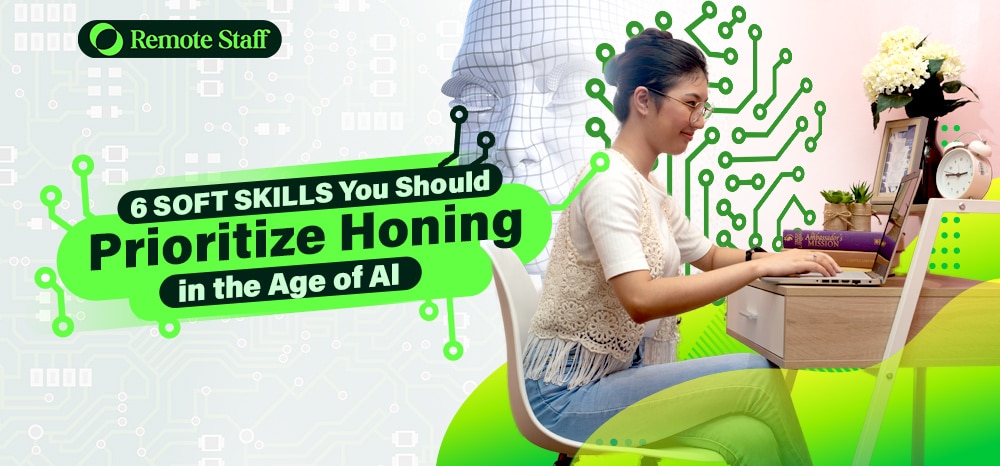As the future demand for artificial intelligence continuously grows, many fear it won’t be long before AIs replace humans at work. Even today, jobs like telemarketers and bookkeepers are under threat of becoming obsolete because of AI.
Besides upskilling your work-related skills to future-proof your career and stay competitive against AI, you shouldn’t forget to hone your soft skills too. These help you do tasks only humans can do that AI can’t.
Aside from this, how else can honing your soft skills help you stay ahead of AI? In addition, which soft skills should you prioritize learning in the age of AI?
Let’s find out.

Soft Skills in the Age of AI.
In the modern workplace, hard skills aren’t the only things employers look for.
Modern AI can crunch numbers quickly and efficiently, write essays, and even generate human-like art. But can it generate innovative ideas? Or lead and manage human employees? Or have a conversation with a customer that won’t make them feel like they’re talking to an answering machine?
Thus, one of the primary edges humans have against AI is our soft skills. And by further honing that, we can stay one step ahead of AIs and hold on to our jobs.

A Sense of Curiosity and an Eagerness to Learn.
One skill unique to humans that AI doesn’t have (yet) is the ability to learn by ourselves. For AI to do the same, it must be programmed to “learn” new things by its programmers. And even then, they can’t go beyond what they’re programmed to do.
Thus, one of the soft skills you should have in the age of AI is a sense of curiosity and an eagerness to learn. This skill helps motivate you to learn more about your field and how to work better with AI to be more efficient and productive at work.
In addition, a healthy sense of curiosity and eagerness to learn new things also helps you branch out of your chosen field into new ones. This helps widen your opportunities and become more versatile in your workplace or for when you’re job-hunting.

Critical Thinking.
Despite the advances in AI, there is no technology (yet) that can replicate man’s ability to do complex analyses and think for themselves.
Remember, an AI will follow what it’s programmed to do to the letter, even when it’s wrong. And despite the safeguards placed on it, it’s still easy to find work-arounds in its programming.
Humans don’t have such limitations. Sure, we all make mistakes sometimes. But unlike AI, we can learn from this and prevent it from happening next time.
And here is why honing your critical thinking skills becomes invaluable. These help you make objective decisions and solve complex problems, so you’ll rely less on your co-workers.

Creativity.
As Elbert Hubbard said: “One machine can do the work of fifty ordinary men. No machine can do the work of one ordinary man.”
Sure, AI can now generate human-like art and responses. But when you take a closer look, you’ll notice how emotionless, bland, and unoriginal they are. Worse still, many artists have found that AI are stealing their work.
At the end of the day, AI still lacks human creativity. It can’t generate new ideas from scratch and must rely on existing data to make something. That’s why AI can help analyze data but can’t interpret it.
That is why one of the soft skills you must hone in this age of AI is creativity. Creativity enables you to develop novel solutions to problems you encounter at work and provide new insights to help your company grow.

Emotional Intelligence.
One of the jobs that AI will create are AI trainers. These individuals will train AI to generate more human-like responses to customers.
If you’re looking for a new career to try to get into, this could be it. But first, you must ensure you have the right skills for the job. The most important of which is emotional intelligence.
What is emotional intelligence? It is the ability to manage your emotions while understanding those of the people around you. This skill enables you to better understand your feelings and that of others and how these affect your actions and behavior. It includes skills such as empathy, communication skills, and managing your emotions.
The point is, a high emotional intelligence is a good asset in the workplace. It allows you to form better relationships with your boss and co-workers, which improves workplace morale and everyone’s overall productivity as a result.

Leadership Skills.
Companies still need good leaders to manage their remote teams, even in the age of AI. After all, AI can only follow orders, not issue them.
Thus, excellent leaders will always be an invaluable asset to a company. These individuals are responsible for supervising their team members so they can be more productive and efficient.
So if you want to ascend the company’s hierarchical ladder, you must have excellent leadership skills. These include the ability to manage the various personalities of your teammates, inspire them with your deeds, and hold the line in the face of setbacks.

Being Able to Welcome Change.
It’s hard adapting to and welcoming change, especially when it happens so fast you have trouble keeping up with it. Change means going out of your comfort zone to explore or study something completely unfamiliar to you.
But that’s why companies need someone willing to welcome change and adapt to it: not many people can do that. Especially now that AI is set to replace lower-level jobs, you either learn to swim or sink.

Utilizing the Human Factor to Stay Ahead of AI.
Modern AI is capable of impressive feats that we used to think belonged in the realm of science fiction. But despite its advancements, there are many things it can’t do, such as think outside the box, sympathize with customers, or adapt on the fly.
And here lies a human employee’s best edge over AI: our soft skills.
If you already have these skills but don’t have an online job yet, Remote Staff is here to help. Our jobs list has various positions you can apply to, so you’ll never run out of options. Good luck!

